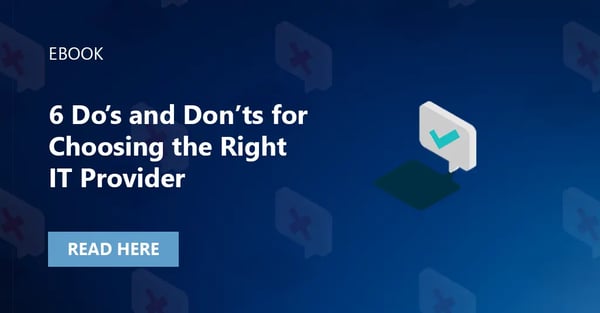For an industry built on specifications, technical terminology can be surprisingly vague. Business IT consulting, IT services, and software consulting, for instance, may appear distinct and self-explanatory at first glance. In truth, it can be difficult to tell where one ends and another begins. From an IT perspective, cutting through the subtlety establishes vital competitive distinctions, and helps set important customer expectations. But is clarity the issue, or are there true distinctions that characterize these terms?
Let’s Take a Closer Look at the Difference Between IT Services and IT Consulting:
IT Consulting
At a high level, IT consultants provide guidance to customers on everything from overall IT strategy – including what to house in the data center versus in the cloud; to the type of technology and functionality needed within the context of the customer’s IT and business environments and goals – such as process automation or mobile security. Having immediate access to industry IT experts is invaluable to some companies. A technical consulting firm gives an organization access to expert best practices, knowledge gained from working with many companies, for as long as they like.
For Rajeev Badgujar, a former software engineer at Symantec and a member of the technical staff at Coriolis Technologies, the distinction between an IT consultant and an IT services professional is clear. “A consultant is the domain expert in a particular area/sector who knows WHAT features/functionalities to be added to a product or service.” A developer or other IT services expert “knows HOW to code the functionalities.”
“Consulting is more than advising,” suggests José Franco, in his Spiceworks article, The Five Fundamentals of IT Consulting, “it is assisting clients to reach a goal” and “prepar[ing] the client for the real-world issues of implementation and system operation.” In some cases, Franco says, customers not only want the consultants to recommend solutions, but they also want the consultants to help implement them. This is where the distinction between IT consulting and IT services begin to blur.
IT Services
Managed services companies were at the forefront of leveraging new IT paradigms such as cloud computing and cloud archiving, to deliver improved services such as data back-up and overall business continuity. A Spiceworks moderator suggests that perhaps the “biggest difference exists in the mentality” of the provider. He explains: The IT consultant is paid to find the right solution for the customer. An IT services provider offers a solution that is “comprised of what they have in their tool chest.” If a services provider is a Microsoft shop, for instance, then Microsoft solutions likely are going to be what customers get – whether or not that’s the best solution for them.
To extend the confusion of terms further, IT services providers also may offer consulting. This “is really pre-sales engineering to figure out how to make what [the IT services providers] have work for your situation,” notes Alex. And while delivering a solid solution is in the provider’s mind, “the client’s best interest may not be,” Alex says. When you consider the role of the consultant as an expert strategic guide and the IT services provider the solution or services implementer, then the distinction becomes more clear-cut.
Software Consulting
Consulting in technology quickly becomes muddled in prefixes – IT, technology, software, etc., but they each do have distinctions as specialties. Software consulting is focused on the software and applications layer. It is a broad term, though, that can cover many different types of software – and industries. Technical consultants are generally trained specifically to perform a set of services. They have the luxury of being able to gather knowledge, from experience and study, that internal IT professionals may not have time to.
The responsibilities of the software consultant are similar to those of the IT consultant. They counsel on “how the application should be implemented using current industry approaches... often provid[ing] technical advice on how to configure a large application (SAP, Oracle, etc.).” In the end, Marathe echoes the general consensus, concluding that “there are no definite boundaries” among IT consulting, IT services, and software consulting. A quick Google search certainly confirms this. The boundaries, it seems, begin – and end – with the somewhat loose definitions offered by the IT professionals themselves.
Managed Services Partnership
A partnership with an experienced and trustworthy IT outsourcing provider can help launch your business forward. For decades, iCorps has been providing our clients the cost-effective IT outsourcing, technology solutions, and technology management they need for day-to-day IT tasks and long-term strategic goals. For more information about IT consulting vs IT services, reach out for a free IT consultation.
*Editor's Note: This blog was originally published on November 24, 2014 and has since been updated.

![[BLOG] IT Support, Security & Managed IT Services](https://www.icorps.com/hubfs/2022%20Webp%20Image%20Files/Hero%20Images/New%20Upright%20Hublox%20webp.webp)

![[BLOG] How Outsourced IT Partners Can Boost Productivity for Your Business Webp](https://www.icorps.com/hs-fs/hubfs/2022%20Webp%20Image%20Files/September%2029/%5BBLOG%5D%20How%20Outsourced%20IT%20Partners%20Can%20Boost%20Productivity%20for%20Your%20Business%20Webp.webp?width=600&name=%5BBLOG%5D%20How%20Outsourced%20IT%20Partners%20Can%20Boost%20Productivity%20for%20Your%20Business%20Webp.webp)




